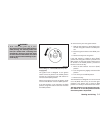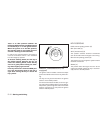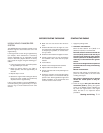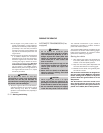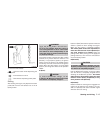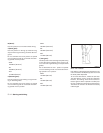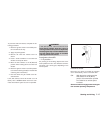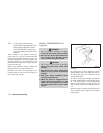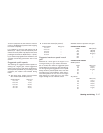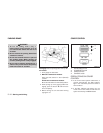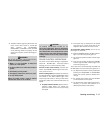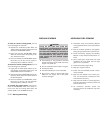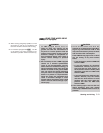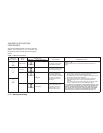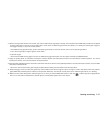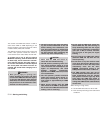To back up depress the shift selector and then
move itto theR (Reverse) positionafter stopping
the vehicle completely.
If it is difficult to move the shift selector into R
(Reverse) or 1 (First), shift into N (Neutral), then
release theclutch pedal. Fully depressthe clutch
pedal againand shiftinto R(Reverse) or1 (First).
Ifyourvehicleisequippedwith4-wheeldrive, see
“Transfer case shifting procedures” later in this
section.
Suggested upshift speeds
The following are suggested vehicle speeds for
shifting into a higher gear. These suggestions
relate to fuel economy and vehicle performance.
Actual upshift speeds will vary according to road
conditions, the weather and individual driving
habits.
● Two-wheel drive models and four-wheel
drive models (2H and 4H position):
GEAR CHANGE MPH (km/h)
1st to2nd 11 (18)
2nd to3rd 17(27)
3rd to4th 25 (40)
4th to5th 32 (51)
5th to6th 45 (72)
● 4–wheel drive model (4L position):
GEAR CHANGE MPH (km/h)
1st to2nd —
2nd to3rd —
3rd to4th —
4th to5th —
5th to6th —
Suggested maximum speed in each
gear
Downshift to a lower gear if the engine is not
running smoothly, or if you need to accelerate.
Do not exceed the maximum suggested speed
(shown below) in anygear. For level road driving,
use the highest gear suggested for that speed.
Always observe posted speed limits, and drive
according to the road conditions, which will en-
sure safe operation. Do not over-rev the engine
when shifting to a lower gear as it may cause
engine damage or loss of vehicle control.
Allowable maximum speed in each gear:
2–wheel drive models
GEAR MPH (km/h)
1st 35 (56)
2nd 60 (97)
3rd 87 (141)
4th —
5th —
6th —
4–wheel drive models
2H/4H position
GEAR MPH (km/h)
1st 34 (55)
2nd 60 (97)
3rd 87(140)
4th —
5th —
6th —
4L position
GEAR MPH (km/h)
1st 13 (21)
2nd 22 (36)
3rd 33 (53)
4th 45 (72)
5th 57 (93)
6th —
Starting and driving 5-17



